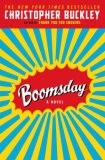Summary | Excerpt | Reading Guide | Reviews | Beyond the book | Read-Alikes | Genres & Themes | Author Bio

Masterfully plotted, darkly comic, A Changed Man illuminates the everyday transactions in our lives, exposing what remains invisible in plain sight in our drug-addled and media-driven culture.
On an unseasonably warm spring afternoon, a young neo-Nazi named Vincent
Nolan walks into the Manhattan office of World Brotherhood Watch, a human rights
foundation headed by a charismatic Holocaust survivor, Meyer Maslow. Vincent
announces that he wants to make a radical change in his life. But what is Maslow
to make of this rough-looking stranger who claims to have read Maslow's books,
who has Waffen-SS tattoos under his shirtsleeves, and who says that his mission
is to save guys like him from becoming guys like him?
As he gradually turns into the sort of person who might actually be able to
do that, Vincent also transforms those around him: Maslow, who fears that
heroism has become a desk job; Bonnie Kalen, the foundation's fund-raiser, a
divorced single mother and a devoted believer in Maslow's crusade against
intolerance and injustice; and Bonnie's teenage son, Danny, whose take on the
world around him is at once openhearted, sharp-eyed, and as fundamentally decent
as his mother's.
Masterfully plotted, darkly comic, A Changed Man illuminates the
everyday transactions in our lives, exposing what remains invisible in plain
sight in our drug-addled and media-driven culture. Remarkable for the author's
tender sympathy for her characters, A Changed Man poses the essential
questions: What constitutes a life worth living? Is it possible to change? What
does it mean to be a moral human being? The fearless intelligence, wit, and
humanity that inform this novel make it Francine Prose's most accomplished yet.
If you think you'd enjoy a 'comedy of manners' which fairly gently skewers the middle-classes then this might be one for you; but if you're anticipating a book that digs deep you might be disappointed...continued
Full Review
 (416 words)
(416 words)
(Reviewed by BookBrowse Review Team).
Francine Prose is the author of about 20 books, including Blue Angel
(2000) which was a finalist for the National Book Award; she is considered one of
America's sharpest cultural satirists. She says "I really do love my
characters...I don't
find them guilty of anything that I'm not guilty of myself."
She says she was inspired to write A Changed Man after seeing two skinheads
on the New York subway, all dressed up with jackboots and shaved heads, but
looking terrified - it was clear to her that they were out of their element,
which made her curious about what kind of people they were. Later she saw
a middle-aged man with hair growing over his tattoos, one of which looked like a
swastika and she thought 'this is...

If you liked A Changed Man, try these:

by Christopher Buckley
Published 2008
One of America’s most hilarious novelists and the bestselling author of Thank You For Smoking returns with a biting comedy about generational warfare.

by Philip Roth
Published 2005
This may be alternative history, but it is chillingly and convincingly realistic in its portrayal. The reader watches, horrified yet totally absorbed, as America spirals down the path toward fascism.
Second hand books are wild books...
Click Here to find out who said this, as well as discovering other famous literary quotes!